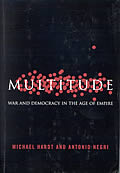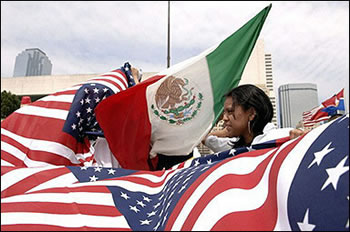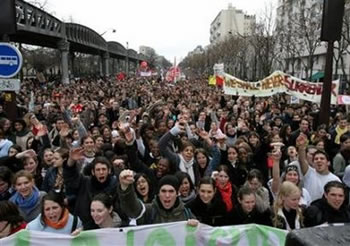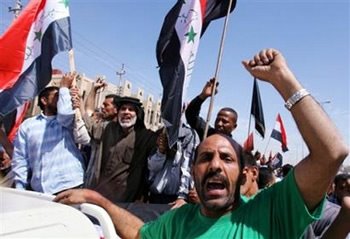Multitude(s)

Okay, okay, I admit it, I have been re-reading Michael Hardt and Tony Negri's texts, Empire and Multitude again. The reason being, I got ahold of a coopy of Empire's New Clothes: Reading Hardt and Negri, and really enjoyed the essays. There's one by Ernesto Laclau, another by Peter Fitzpatrick, one by Slavoj Zizek, and a number of others. While all must attest to the obvious and overall correctness of Empire, they nonetheless pinpoint of number of theoretical weakpoints in the duo's theories.
For example, Laclau's intervention asks in its title, "Can Immanence Explain Social Struggles?" putting into question the theoretical edifice and genealogies of Hardt and Negri that leads them to their concept of multitude, and whether or not politics is still possible under it. In Zizek's essay "The Ideology of Empire and Its Traps," he makes a similar critique, "Does the Deleuzian theory that forms the philosophical background of Empire provide the conceptual apparatus properly to conceive thi antagonism?" The antagonism Zizek is referring to is the liberal-democratic, multiculturalist one that transforms any vertical antagonism into a horizontal one. Thereby censoring any authentic political action.
I understand of course the critiques that these authors and others in the text make. But at the same time, Empire and Multitude seem to be having a similar effect as Hegemony and Socialist Strategy: Towards a Radical Democratic Politics had two decades ago, although for a different audience. Whereas Hegemony and Socialist Strategy tranformed Marx in the academy and formalized a new language for postmodern/ poststructuralist politics, Empire seems to be helping people involved in anti-globalization efforts and transnational activism and movements. Of course Empire didn't start these movements, but it, along with other texts, are becoming crucial ideological, theoretical and cultural tools for linking movements together, for making the multitude appear, making it happen. (hehehe, I'm using Laclau and Mouffe to talk about Hardt and Negri's theories, ooooh, lachi este siempre, lana, ai todu babarias.)
I'm obsessing about multitudes lately because of all the multitudes that are gathering and forming within nations, across borders right now.
As the world is deterritorialized and reterritorialized, imperial sovereignty, Empire, is produced, a particular form of globality is asserted as univerality. But this act cannot take place without a counter, without a reflective and refractive excess. As the globe is remade, so also is possibility. The existence of Empire brings with it the possibility of Multitude. But as Empire is able to cross all nations, so too must the Multitude. Across which borders are these protests travelling and what other borders will they transgress? In these movements we find the positions where we still must seek out universality, but not in its positive forms, but as negatives. The positions which if universalized hold the truth of the limits, the ghosts of any society. The positions which the nation struggles to contain and to formalize, to articulate as excess, because of these very critiques, these truths.
Oh, and I am very aware that "multitude(s)" goes completely against Hardt and Negri's ultimate point. But then again, Multitude is strangely antipolitical, yet being used for political purposes and projects. The immanence, the end to representation that they reformat for today's world can never be expunged or eliminated, the utopianism is always there.
I'm posting four articles for this one, partially since I'll be away from a computer for the next four days at a conference.
Published on Wednesday, March 29, 2006 by OneWorld.net
Organizers See 'New Civil Rights Movement' in Immigration Protests
by Niko Kyriakou
SAN FRANCISCO - The past three weeks' nationwide protests against proposed immigration reforms considered anti-immigrant mark the rise of a new American civil rights movement, say protest groups.

Protesters' ultimate impact on the immigration debate remains to be seen. Mass protests leading up to the 2003 invasion of Iraq failed to dissuade legislators from giving President George W. Bush authority to take the nation to war, after all.
Even so, protest organizers said their efforts played a large part in persuading the Senate Judiciary Committee to approve a more immigrant-friendly bill Monday than the one put forward previously by the House of Representatives.
Partha Banerjee, executive director of the New Jersey Immigration Policy Network, said the ongoing protests can have a greater impact yet because, like the struggle for civil rights in the mid-1900s, they represent the interests of not just one minority but all migrant groups.
''This is so effective because this is really a new civil rights movement reborn in this country,'' Banerjee told OneWorld. ''Remember, back in the 50s, the huge civil rights movement in this country was primarily about the blacks, but also about other minorities.''
''This is not just about the immigrants,'' she added. ''It's about human and civil rights, it's about all marginalized, under-privileged people in the United States.''
Last December, the House of Representatives passed the Border Protection, Antiterrorism, and Illegal Immigration Control Act of 2005, legislation that critics said would slam the hopes of immigrant rights advocates and the country's 11 million-odd undocumented workers. The Senate Judiciary Committee approved a much more immigrant-friendly version of the legislation Monday.
Before the Senate panel voted, more than 500,000 protesters took to the streets of Los Angeles, 300,000 rose up in Chicago, and thousands more marched, went on work-and-spending strikes, or even hunger strike across the country, according to Banerjee and other protest organizers.
While most of those involved in the larger outpourings appeared to be Latino, their views resonate with large majorities of legal immigrants, according to a nationwide survey conducted by private pollsters and released Tuesday by California-based New America Media (NAM), an association of more than 700 ethnic newspapers and broadcast outlets.
Pollsters canvassed a representative sample of 800 of the 26 million U.S. residents who have gained legal entry and found that most strongly opposed Congressional proposals to criminalize and deport undocumented immigrants and authorize walls and other barriers to be built along the U.S.-Mexican border.
Members of all immigrant communities also voiced alarm over what they termed growing anti-immigrant sentiment throughout the country, according to the survey co-sponsored by the Center for American Progress and the Leadership Conference on Civil Rights Education Fund.
Banerjee said immigrants also had found strong allies among church and labor groups. Some of these, she added, worked closely with her organization to assemble some 200 clergy from various denominations, and more than one thousand community leaders, on Capitol Hill Monday to voice their support for immigrant rights.
In her view, that pressure should be credited with helping Republicans on the Senate Judiciary Panel to blunt the House of Representatives' assault on migrants.
Some Republicans have criticized the strident House proposals, saying these could prove disastrous to the party's hopes of building support among Latino voters.
The legislation that the Senate Judiciary Committee endorsed on Monday would legalize undocumented immigrants if they pay their back taxes, learn English, and follow a number of other requirements.
It also would offer a guest-worker program that could allow up to 400,000 immigrants per year to enter the United States legally.
In contrast, the House proposal would make it a felony to enter the United States illegally and would erect a 700-mile fence along the border with Mexico.
The full Senate is expected to debate the measure adopted by the judiciary panel over the next couple of weeks. Even if it passes, the bill will need to be reconciled with the House legislation before being sent on for Bush to sign into law.
Activists anticipate safe passage of the Senate bill but are bracing for real battle when the House of Representatives, which they describe as home to a number of virulent anti-immigration legislators, weighs compromise.
''We are really hopeful that some comprehensive solutions will come out of the Senate and we are going to keep pressure up,'' said Marissa Graciosa, a spokeswoman for the Illinois Coalition for Immigrant and Refugee Rights, which helped organize the Chicago protest last weekend.
Graciosa said her organization wanted to ensure the legislation ultimately adopted provides ''a path to citizenship'' for undocumented immigrants so that ''people who work hard are rewarded.''
Commenting on the size of protests so far, Graciosa said the movement benefited from a diverse base of organizers.
''There were over 100 organizations that were working on this,'' she said, referring to the Chicago demonstration. ''The Spanish language deejays were really helpful in telling people that H.R. 4437 [the House immigration measure] is a horrible bill and that unless we get in the streets and tell them about it, that kind of anti-immigration policy could become reality.''
In Los Angeles, Service Employees International Union (SEIU) Local 1877, a janitor's union, provided security for the protests and coordinated around one hundred buses that dropped off protesters from around the country.
© 2006 OneWorld.net
###
Published on Wednesday, March 29, 2006 by the Independent/UK
'Three Million' March Against French Law
by John Lichfield in Paris
In the biggest anti-government protests for at least a decade, more than 200,000 people marched through the streets of Paris to protest against controversial new employment contracts for the young.

French students shout slogans at a nationwide protest demanding the government to scrap a contentious youth job law in Paris March 28, 2006. (Jacky Naegelen/Reuters)Union leaders claimed that yesterday's demonstrations throughout France attracted more than three million people, which would make them the largest protests for almost half a century.
Scattered violence erupted on the edges of the Paris march. There were also running battles at the end in the Place de la République between police and multi-racial gangs of teenagers from deprived suburbs. But police and union security teams - and heavy downpours of rain - prevented the kind of widespread robberies, beatings and pitched battles seen at the end of a march last Thursday.
A nationwide day of strike action called by the five main trades union federations to protest against the contrat prèmiere embauche or "first job contract" was less successful. Many schools closed. One in three internal flights was cancelled. Only half of regional trains were running. The Eiffel Tower and the Paris Opera were forced to shut down.
But the unions failed to achieve the kind of widespread disruption that they were hoping for. On the Paris Metro, two in three trains ran normally. High-speed and international trains were hardly affected. Private industry was barely touched.
Judging by the huge and high-spirited turn-out for the march through eastern Paris, the month-old dispute has now mobilised the young and the many and varied tribes of the French left. However, the relatively poor turn-out for the strikes suggests that the battle has yet to interest the great majority of the French working and salaried classes.
Despite the huge turn-out for the street marches - police estimated the national total to be 1,500,000, and unions double that - the Prime Minister, Dominique de Villepin, may take some comfort from yesterday's events.
M Villepin's "first jobs contract" is meant to reduce the 23 per cent youth unemployment in France. Under the new law, companies can hire people under the age of 26 for a two-year trial period. During that time, they can be fired without explanation (but with compensation).
Yesterday, M Villepin once again offered to negotiate on some of the more controversial terms of the new law, but refused to withdraw it altogether. The number two in the government, the Interior minister, Nicolas Sarkozy, distanced himself from M Villepin on Monday night, calling for the law to be "placed in abeyance" during negotiations with unions and students.
Student unions say that the law treats the young as a "disposable" commodity. Unions complain that it drives a wedge in to decades of accumulated legal protections of employment. The law has also become a symbol of what many on the French left see - or like to see - as wicked, anti-social, "ultra-capitalist" influences from the US and Britain.
© 2006 Independent News and Media Limited
###
Published on Wednesday, March 29, 2006 by Inter Press Service
World Demonstrations Strengthen Iraqis
Three years after the occupation, calls for unity in fighting it are gaining ground across Iraq
by Brian Conley and Isam Rashid
BAGHDAD - The memory of the invasion brings sadness, but Iraqis still take heart each year when they hear and see the demonstrations of solidarity with them all over the world.
Usama Asa'ad, a 34-year-old living in Baghdad told IPS that the anniversary of the invasion last week was "a very sad day for all Iraqis because it was the beginning of the destruction of Iraq by occupation forces without real reason."
 Although the anniversary always brings new frustration in Iraq, there is some hope too. The continuing anti-war movement is welcomed. Those Iraqis who can receive images of anti-war marches by television are excited to do so, others read about them in the papers, or hear from their neighbours.
Although the anniversary always brings new frustration in Iraq, there is some hope too. The continuing anti-war movement is welcomed. Those Iraqis who can receive images of anti-war marches by television are excited to do so, others read about them in the papers, or hear from their neighbours."Your demonstrations are a great help for Iraq and for justice, and thank you so much for this help," Zainab Rahman said, as if addressing the demonstrators.
The Muslim Scholars Association, a group representing Sunni Muslims in Iraq, issued a statement contesting Bush's claims of ongoing progress in Iraq.
"Three years ago the U.S. and UK forces came from across the world to occupy Iraq without reason and without respecting UN and the Security Council decisions," the Association said. "Now, after three years you can see how the Iraq situation is very bad, and we don't know what kind of help we can get from occupation."
With the third anniversary come and past, Iraqis are still looking for basic services such as electricity and clean water.
In January and February, Baghdadis could only count on three to five hours of electricity a day. This has improved to an average of perhaps seven hours of electricity on a given day.
Asa'ad is one of many Baghdadis increasingly frustrated by the services situation in the capital. He is heartened, however, by the understanding of demonstrators around the world.
"I can't thank them enough because they feel for Iraq and Iraqi peoples' suffering. We will do the same if anything bad happens to any of these countries, to share their feelings as they do now and because we are human and we must all feel for each other."
Many Iraqis talk at length about the future of Iraq and in particular the future for the Bush Administration and other nations involved with the Multi-National Forces-Iraq. Discussions take place all the time about war crimes and what the United Nations could do to deal with the occupation force.
"I think the international court must try the U.S. government for their crimes in Iraq, like they did with Germany's officers after the second world war," Baghdad resident Ahmed Noor told IPS.
The foreign press rarely discuss the initial drive to war now, having tired of the changing reasons the Bush Administration offers to excuse the war. Iraqis however, remember the approach to war each year.
Usama Asa'ad remembers well the beginning of the war and the various excuses for war presented by Bush. "I would like to say to him, there is no real reason for this war and he lied to all the world when he said the Iraqi government had thousands of tonnes of chemical weapons, and they were working to make nuclear weapons. After this three years the world discovered all of this was lies."
Asa'ad added: "It was not a war for justice. The U.S. government wanted only to control the Iraqi oil, and that would help them to control the world after Iraq."
Ali Fathi, a 38 year-old member of the Iraqi Islamic Party agreed with Asa'ad about the lies of the Bush Administration and the coalition. "They haven't a real reason for this war," he told IPS. "All of their reasons were fake, but their purpose was to destroy Islam and Iraq. Iraq was their first step."
Ali Fathi was thankful for the demonstrations around the world, but said only the resistance will end the occupation. "I would like to say to the resistance, keep up with your work because their work is the main force to end the occupation, and then Iraqi people can do whatever they want in their country."
Ahmed Noor said "we don't need to hope, we need to work very hard to end the occupation and then we can build a new Iraq with a real democratic government; to show all the world how we wish to live in peace without blood and without bombs and wars."
The Muslim Scholars Association also called for action. " Now we ask Iraqi people to join hands together to end the occupation, and at the same time, we ask occupation forces to withdraw their troops as soon as possible.
© 2006 Inter Press Service
###
Published on Monday, November 7, 2005
by Inter Press Service
Riots Spread Into Rebellion
by Julio Godoy
PARIS - Rioting by immigrant youth around Paris has begun to take the shape of a nationwide rebellion against racial and social segregation, and repressive police action.

A fireman tries to put out a fire in a car in a Paris surburb on the tenth straight night of unrest following the electrocution of two boys who believed they were being chased by the police. The French riots are a warning to Europe that racial integration requires a political solution, the head of Britain's race relations watchdog said (AFP/File/Stephane De Sakutin).
Over the weekend gangs comprising youth mostly from the Maghreb countries and sub- Saharan Africa set fire to more than a thousand vehicles, several supermarkets, and public buildings including schools and sport facilities.
Vehicles were burnt in the centre of Paris for the first time since the beginning of the unrest 11 days ago. Similar violence broke out in other cities including Marseille, Rennes, Nantes and Lille.
The police have been unable to re-establish order despite strong action. Hit-and-run youth gangs coordinating action over mobile phones have been too quick for them. It now seems less and less likely that police action alone can restore calm.
The unrest began Oct. 27 after two immigrant children died accidentally in a high-voltage electricity facility in Clichy-sous-Bois, a poor district some 30km north-east of Paris. In the face of rumours that they were being chased by the police, which the police deny, angry youths went on the rampage.
The police reacted with force, in one instance hurling tear-gas grenades into a mosque. Most residents of the Parisian outskirts where the unrest began are Muslims. Such action was seen by many residents as provocative.
Minister for the interior Nicholas Sarkozy's remarks calling violent youth 'scum' also provoked further violence, several experts say. "Sarkozy's choice of words makes me think of the rhetoric used by military police in racial dictatorships, and of regimes practising ethnic cleansing," Hugues Lagrange, social researcher at the independent Paris Observatory of Social Change told IPS.
Lagrange said conditions of extreme poverty, high unemployment and the racial segregation that hinders immigrant access to jobs lay at the heart of the rebellion. Instead of dealing with these issues, Sarkozy is stirring up unrest "to establish tighter electoral links with a populist right-wing extremist population."
Lagrange said one of Sarkozy's first measures as minister of the interior was to disband a special police unit created by the former Socialist government in 1997 to maintain close contact with youth organisations to prevent any outbreak of violence.
"The duty of police officers is to chase criminals, not to play football with them," Sarkozy said at the time.
Deep political divisions have emerged over the violence. Neo-fascist leader Jacques Bompard and the right-wing nationalist Philippe de Villiers have urged the government to call in the army to suppress the rebellion. De Villiers said the rebellion is proof that the French model of integration "has clearly failed."
On the other hand, local Muslim leaders say Sarkozy must be sacked. They said in a statement that after the attack on the mosque and Sarkozy's abuse of youth, they "do not consider Sarkozy an appropriate negotiation partner."
President Jacques Chirac indirectly condemned Sarkozy's response. "The law shall be firmly applied, but in a spirit of respect and dialogue," Chirac had said last Wednesday.
But opposition leaders and several commentators are urging Chirac to throw Sarkozy out of government. "Sarkozy is an arsonist pretending to be a fireman" ran the title of an editorial comment in the leftist newspaper L'Humanité.
Noel Mamère, leader of the Green Party, called Sarkozy "a danger for French democracy, a danger destroying rapidly the year-long integration efforts carried out by social workers and organisations in the field." He said if Sarkozy does not resign, "the government must kick him out."
Christian Pfeiffer, a German criminologist who has been researching youth unrest in Europe, said "Sarkozy's behaviour is absolutely unacceptable."
Sarkozy has refused to apologise. "I cannot understand why people make such a fuss about words, but ignore the reality of riots and crimes," he said. He said the riots had been "carefully organised...by criminal mafias and by religious extremists."
City mayors and social workers all over France are calling for a major plan to develop low- income districts to avoid future explosions of violence. Jean-Marie Bockel, mayor of Mullhouse in the north-east, has called for "a Marshall plan for our districts."
Copyright © 2005 IPS-Inter Press Service
###



Comments